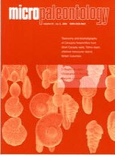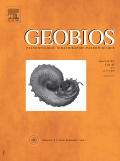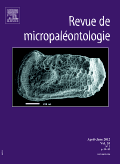
MICROPALEONTOLOGY
metrics 2024
Decoding Earth's History Through Microscopic Evidence
Introduction
MICROPALEONTOLOGY is a prominent journal dedicated to advancing the field of paleontology, published by MICRO PRESS. With an ISSN of 0026-2803 and an E-ISSN of 1937-2795, this esteemed publication has been a vital resource since its inception in 1979, continuing to influence the field through 2024. The journal ranks within the Q2 category for Paleontology, highlighting its relevance and quality in the academic community. Notably, it holds a Scopus rank of #41 out of 113 within the Earth and Planetary Sciences field, placing it in the 64th percentile, indicative of its significant impact. Although not an open-access journal, MICROPALEONTOLOGY remains committed to disseminating crucial research findings, making it an essential platform for researchers, professionals, and students dedicated to exploring the intricacies of microfossils and their implications for understanding past environments. With its strategic focus and rigorous peer-review process, this journal plays a critical role in bridging past geological events with contemporary scientific inquiries.
Metrics 2024
 0.47
0.47 1.30
1.30 1.20
1.20 49
49Metrics History
Rank 2024
Scopus
IF (Web Of Science)
JCI (Web Of Science)
Quartile History
Similar Journals

JOURNAL OF THE GEOLOGICAL SOCIETY OF INDIA
Fostering scholarly dialogue in Earth and Planetary Sciences.JOURNAL OF THE GEOLOGICAL SOCIETY OF INDIA, published by Springer India, serves as a pivotal platform for researchers and practitioners in the field of geology. Established in 1979, this journal has been instrumental in advancing geological research throughout India, showcasing both regional studies and cutting-edge global research. With its Category Quartile ranking of Q3 in the geology category for 2023, and a significant Scopus rank of 171 among 321 journals in Earth and Planetary Sciences, it remains a respected source of scholarly activity. The journal is dedicated to the dissemination of original research articles, reviews, and case studies that encapsulate the dynamic scope of geological science, thus contributing to the understanding of geological phenomena. Although currently not offering open access, the journal maintains a commitment to high-quality scholarship and aims to engage a diverse readership, enhancing the knowledge and practice of geology across various disciplines.

Paleoceanography and Paleoclimatology
Illuminating the Past to Understand Our FuturePaleoceanography and Paleoclimatology, published by the American Geophysical Union, is an esteemed open-access journal dedicated to advancing the fields of atmospheric science, paleontology, and oceanography. With an impressive Q1 ranking in all these categories for 2023, the journal is recognized for its impactful contribution, housing research that explores the intricacies of ancient oceanic and climatic systems from 2018 to 2024. Researchers benefit from its robust Scopus rankings, placing it among the top publications in both paleontology and oceanography, with ranks of #5 and #21, respectively, showcasing its significance in the academic community. The journal provides a vital platform for groundbreaking studies that address critical questions regarding Earth's historical climate and ocean processes, making it an essential resource for researchers, professionals, and students alike.

RECORDS OF THE AUSTRALIAN MUSEUM
Fostering Scholarly Dialogue on Australia’s Ecological LegacyRecords of the Australian Museum is a leading journal in the fields of Animal Science, Ecology, History, and Museology, published by the renowned Australian Museum in Sydney, Australia. With a commitment to advancing knowledge and understanding of natural history and cultural heritage, this journal provides an essential platform for original research, reviews, and significant findings relevant to its diverse academic audience. The journal encompasses a broad scope, including studies in ecology, evolution, behavior, systematics, and the history of science, attracting contributions from leading scholars and professionals. Notably, it ranks highly in various categories, achieving a Q1 ranking in History and Museology, reflecting its impact and prestige within the academic community. Although it operates under a traditional access model, the journal ensures that its robust compilation of cutting-edge research remains vital to researchers, professionals, and students aiming to stay informed of the latest developments in their fields. With converging years of publication since 1983, Records of the Australian Museum continues to play a pivotal role in disseminating critical insights and fostering discussions that shape our understanding of both the natural world and our cultural heritage.

Palaeoworld
Exploring the Depths of Earth's Ancient PastPalaeoworld is a leading peer-reviewed journal published by ELSEVIER, focusing on the dynamic and interdisciplinary fields of paleontology, ecology, and stratigraphy. Established in 2006, the journal aims to facilitate the dissemination of innovative research and significant discoveries that enhance our understanding of past life on Earth. With an impressive impact factor and categorized in the second quartile (Q2) for Ecology, Evolution, Behavior and Systematics, Paleontology, and Stratigraphy in 2023, Palaeoworld stands out in its commitment to high-quality scholarship. The journal is indexed in Scopus, ranking #23 in Paleontology and #14 in Stratigraphy, placing it within the top 20% of publications in these categories. As a valuable resource for researchers, professionals, and students alike, it provides unrestricted access to cutting-edge findings, detailed methodologies, and critical assessments of paleo-environmental data. This journal is not only a repository of knowledge but also a platform for advancing discussions that bridge past ecological patterns with contemporary issues.

PalZ
Advancing Knowledge in PaleobiologyPalZ is a prestigious academic journal in the field of Paleontology, published by Springer Heidelberg in Germany. With a long-standing history that traces back to its converged years from 1914 to 2024, this journal offers invaluable insights into the evolutionary dynamics and ecological relationships of past life forms. Holding a commendable impact factor and ranked in the Q2 category of Paleontology, it consistently showcases high-quality research that resonates within the scientific community, evidenced by its Scopus rank of #38 out of 113 in Earth and Planetary Sciences. PalZ is committed to open access, ensuring that its rich repository of scholarly articles is readily accessible for researchers, professionals, and students alike. By engaging with the journal, readers will encounter cutting-edge studies that are pivotal for advancing our understanding of paleobiology and the historical patterns of biodiversity.

CARNETS DE GEOLOGIE
Fostering Discovery in Geology and PaleontologyCarnets de Geologie is a prominent open-access journal dedicated to the dynamic fields of geology, paleontology, and stratigraphy. Published by Carnets Geologie and based in France, the journal has been a platform for scholarly communication since 2002, facilitating unrestricted access to high-quality research. With a robust impact reflected in its 2023 quartile rankings—Q2 in Geology, Paleontology, and Stratigraphy—Carnets de Geologie ranks favorably within Scopus, positioning itself at the 60th percentile for Earth and Planetary Sciences. The journal aims to disseminate innovative research findings and foster academic discourse among researchers, professionals, and students interested in the intricate aspects of Earth's history and processes. Encompassing a broad scope that reflects continuous developments in the geological sciences, Carnets de Geologie is dedicated to advancing knowledge and understanding within its community.

Swiss Journal of Geosciences
Advancing Earth Sciences Through Open Access InnovationSwiss Journal of Geosciences is a prestigious academic journal dedicated to advancing the field of geosciences, published by SPRINGER INTERNATIONAL PUBLISHING AG. Since its inception in 2007, the journal has established itself as a leading platform for disseminating high-quality research findings in various domains related to Earth and planetary sciences, achieving a notable Q1 ranking in Geology as of 2023. With a solid reputation reflected in its Scopus ranking of Rank #72/321, the journal stands in the 77th percentile within its category. Based in Switzerland, the Swiss Journal of Geosciences embraces an open access model, making it easier for researchers, professionals, and students worldwide to access vital geological research without barriers. The journal’s objectives include promoting interdisciplinary research and fostering insights that address both fundamental and applied geoscientific problems, ensuring it remains a crucial resource for those seeking to understand our planet’s dynamics. Engage with pioneering research and contribute to the vibrant community of geoscientists by exploring the impactful articles published within its pages.

PALAEONTOLOGIA ELECTRONICA
Empowering Scholars with Unrestricted Access to Fossil DiscoveriesPALAEONTOLOGIA ELECTRONICA is a distinguished open-access journal published by COQUINA PRESS, offering a vital platform for the dissemination of cutting-edge research in the fields of Paleontology and Oceanography. Launched in 1998, this journal has continuously fostered scholarly communication, allowing unrestricted access to scientific findings and contributing significantly to the advancement of the field. With an impressive track record since its inception, PALAEONTOLOGIA ELECTRONICA holds a 2023 Scopus ranking of #39 out of 113 in the Paleontology category, demonstrating its value among academic resources as evidenced by its Q2 quartile ranking. The journal is based in the United States, and it encourages submissions that span a diverse range of topics, from fossil analysis to evolutionary biology. As a prominent resource for researchers, educators, and students alike, it plays a crucial role in shaping the future of paleontological study.

GEOBIOS
Fostering Innovation in Earth and Planetary ResearchGEOBIOS is a prominent academic journal published by Elsevier France-Editions Scientifiques Medicales Elsevier, specializing in the fields of Paleontology, Space and Planetary Science, and Stratigraphy. With a rich publication history dating back to 1966, the journal aims to foster scholarly communication and dissemination of significant research findings among professionals and researchers in earth sciences. Recognized for its impact within the scientific community, GEOBIOS holds a respectable Q2 ranking in several categories, positioning it within the top tiers of scientific journals. Despite its traditional publication format, the journal provides a platform for groundbreaking studies that influence our understanding of both the geological past and future planetary developments. The journal's consistent ranking, including Rank #36 in Paleontology and Rank #59 in Space and Planetary Science, underscores its relevance and significance in its field. GEOBIOS serves as an essential resource for those engaged in the exploration of earth's history and its extraterrestrial counterparts, making it invaluable to researchers, students, and professionals alike.

REVUE DE MICROPALEONTOLOGIE
Innovative Research in Microfossil Science for a Sustainable FutureREVUE DE MICROPALEONTOLOGIE is a prestigious academic journal published by Elsevier France - Éditions Scientifiques Médicales Elsevier, specializing in the dynamic field of Paleontology. Since its inception in 1979, the journal has established itself as a vital resource for researchers and professionals dedicated to the study of microfossils and their implications for understanding historical climate changes and biodiversity. With an impressive ranking of Q3 in the Paleontology category and a Scopus rank placing it in the mid-range of its peers, REVUE DE MICROPALEONTOLOGIE serves as an essential platform for disseminating cutting-edge research. While currently not open access, the journal ensures that its content is accessible to a wide audience through various library affiliations. By bridging the gap between theoretical research and practical applications, this journal contributes significantly to advancing knowledge in Earth and Planetary Sciences, making it a valuable tool for students and seasoned researchers alike.